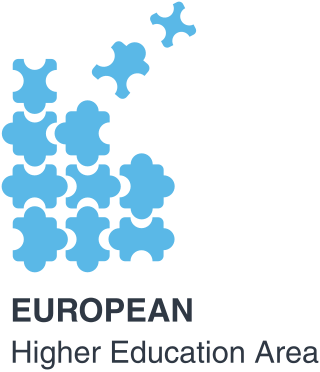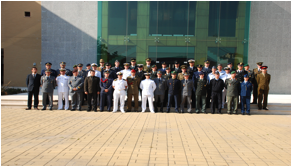
International students, or foreign students, are students who undertake all or part of their tertiary education in a country other than their own.
The Erasmus Programme is a European Union (EU) student exchange programme established in 1987. Erasmus+, or Erasmus Plus, is the new programme combining all the EU's current schemes for education, training, youth and sport, which was started in January 2014.

The European Higher Education Area (EHEA) was launched in March 2010, during the Budapest-Vienna Ministerial Conference, on the occasion of the 10th anniversary of the Bologna Process.

Academic mobility refers to students and teachers in higher education moving to another institution inside or outside of their own country to study or teach for a limited time.

Karadeniz Technical University is a public research university in Trabzon, in the Black Sea Region of Turkey. Established in 1955, it is the fourth oldest university in Turkey. Karadeniz Technical University is a state university institution subject to the Law No. 2547 on Higher Education in Turkey. It is supported mainly by state funds allocated by the Turkish Parliament.
In the European Union education is at the responsibility of its Member States and their Ministries of education that they have; in such, the European Union institutions play only a supporting and overseeing role. According to Art. 165 of the Treaty on the Functioning of the European Union, the Community
shall contribute to the development of quality education by encouraging cooperation between Member States, through actions such as promoting the mobility of citizens, designing joint study programmes, establishing networks, exchanging information or teaching languages of the European Union. The Treaty also contains a commitment to promote life-long learning for all citizens of the Union.
Comparative education is a discipline in the social sciences which entails the scrutiny and evaluation of different educational systems, such as those in various countries. Professionals in this area of endeavor are absorbed in advancing evocative terminologies and guidelines for education worldwide, enhancing educational structures and producing a context to which the success and effectivity of education programs and initiatives can be assessed.
International education refers to a dynamic concept that involves a journey or movement of people, minds, or ideas across political and cultural frontiers. It is facilitated by the globalization phenomenon, which increasingly erases the constraints of geography on economic, social, and cultural arrangements. The concept involves a broad range of learning, for example, formal education and informal learning. It could also involve a reorientation of academic outlook such as the pursuit of "worldmindedness" as a goal so that a school or its academic focus is considered international. For example, the National Association of State Universities prescribes the adoption of "proper education" that reflects the full range of international, social, political, cultural, and economic dialogue. International educators are responsible for "designing, managing, and facilitating programs and activities that help participants to appropriately, effectively, and ethically engage in interactions with culturally diverse people and ideas."
Education in Armenia is held in particular esteem in Armenian culture. Education developed the fastest out of the social services, while health and welfare services attempted to maintain the basic state-planned structure of the Soviet era, following Armenia's independence in 1991. Today, Armenia is trying to implement a new vision for its higher education system while pursuing the goals of the European Higher Education Area. The Ministry of Education and Science oversees education in the country.

The West University of Timișoara is a public higher education institution located in Timișoara. Classified by the Ministry of National Education as a university of education and scientific research, UVT is one of the nine members of the Universitaria Consortium. Also, the West University is a component institution of the National Research–Development–Innovation System in its capacity as an accredited higher education institution.
The University of Peloponnese is a Greek tertiary educational institution, composed of campuses in Tripoli, Corinth, Kalamata, Nafplio, Sparta, and Patras with more than 25,000 students in 9 schools across the campuses, with the former being in turn composed of 22 departments.
The European Union's Erasmus Mundus programme aims to enhance quality in higher education through scholarships and academic co-operation between the EU and the rest of the world. The three main objectives of the programme are linked to the internationalisation of students, staff, curricula and research; ensure an influence on the development of practice in Special Education Needs and inclusive education; and to develop international collaborative networks, projects and research.
The Archimedes Foundation is an independent body established by the Estonian government in 1997 with the objective to coordinate and implement different international and national programmes and projects in the field of training, education, research, technological development and innovation.
Student migration is the movement of students who study outside their country of birth or citizenship for a period of 12 months or more. During the period of globalization, the internationalisation of higher education increased dramatically and it has become a market driven activity. With the rapid rise of international education more and more students are seeking higher education in foreign countries and many international students now consider overseas study a stepping-stone to permanent residency within a country. The contributions that foreign students make to host nation economies, both culturally and financially has encouraged major players to implement further initiatives to facilitate the arrival and integration of overseas students, including substantial amendments to immigration and visa policies and procedures. Institutions are competing hard to attract international students at a time when immigration policies in leading destinations like the US and the UK are not enabling transition to work visas.

The Military Erasmus Programme, formally the European initiative for the exchange of young officers inspired by Erasmus, is an initiative undertaken by the European Union (EU) member states aimed at developing the exchanges between armed forces of future military officers as well as their teachers and instructors during their initial education and training. Due to the fact that the initiative is implemented by the Member States on a purely voluntary basis, their autonomy with regard to military training is not compromised.
Erasmus+ is the European Commission's Programme for education, training, youth, and sport for the period 2021–2027, succeeding the previous programme (2014–2020). As an integrated programme, Erasmus+ offers more opportunities for the mobility of learners and staff and cooperation across the education, training, and youth sectors and is easier to access than its predecessors, with simplified funding rules and a structure that aims to streamline the administration of the programme. The new Erasmus+ Program, running from 2021–27, is more digital, inclusive and innovative, as well as greener.
An academic mobility network is an informal association of universities and government programs that encourages the international exchange of higher education students.
Internationalization of higher education in theory is "the process of integrating an international, intercultural, or global dimension into the purpose, functions or delivery of postsecondary education." Internationalization of higher education in practice is "the process of commercializing research and postsecondary education, and international competition for the recruitment of foreign students from wealthy and privileged countries in order to generate revenue, secure national profile, and build international reputation." The main components of internationalization of higher education are recruitment of international students, development of international branch campuses, students, staff and scholars exchange programs, internationalization of the curriculum, and research and education partnerships between institutions regionally and internationally.
Virtual exchange is an instructional approach or practice for language learning. It broadly refers to the "notion of 'connecting' language learners in pedagogically structured interaction and collaboration" through computer-mediated communication for the purpose of improving their language skills, intercultural communicative competence, and digital literacies. Although it proliferated with the advance of the internet and web 2.0 technologies in the 1990s, its roots can be traced to learning networks pioneered by Célestin Freinet in 1920s and, according to Dooly, even earlier in Jardine's work with collaborative writing at the University of Glasgow at the end of the 17th to the early 18th century.
Blended mobility is an educational concept that combines physical academic mobility, virtual mobility and blended learning. It aims to promote employability of higher education students. Since 2009 it has evolved from virtual mobility, keeping the international value of academic mobility, but at the same time giving a concrete answer to possible family related, financial, psychological and social barriers of a physical mobility.